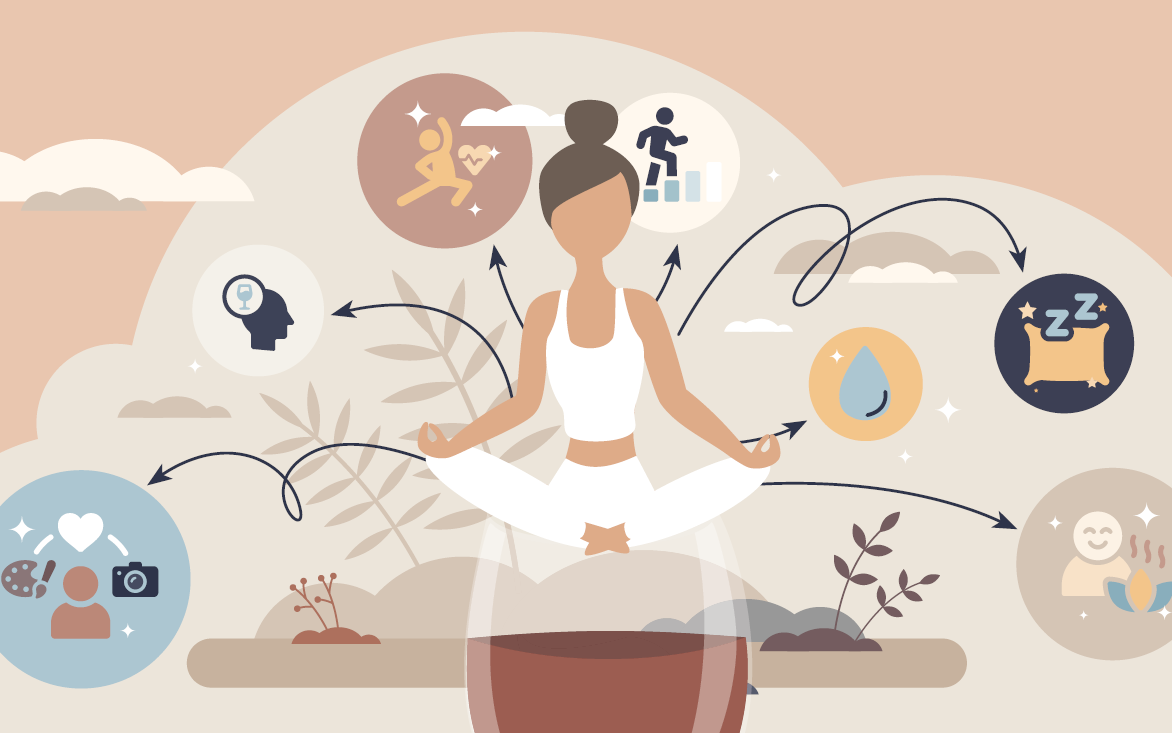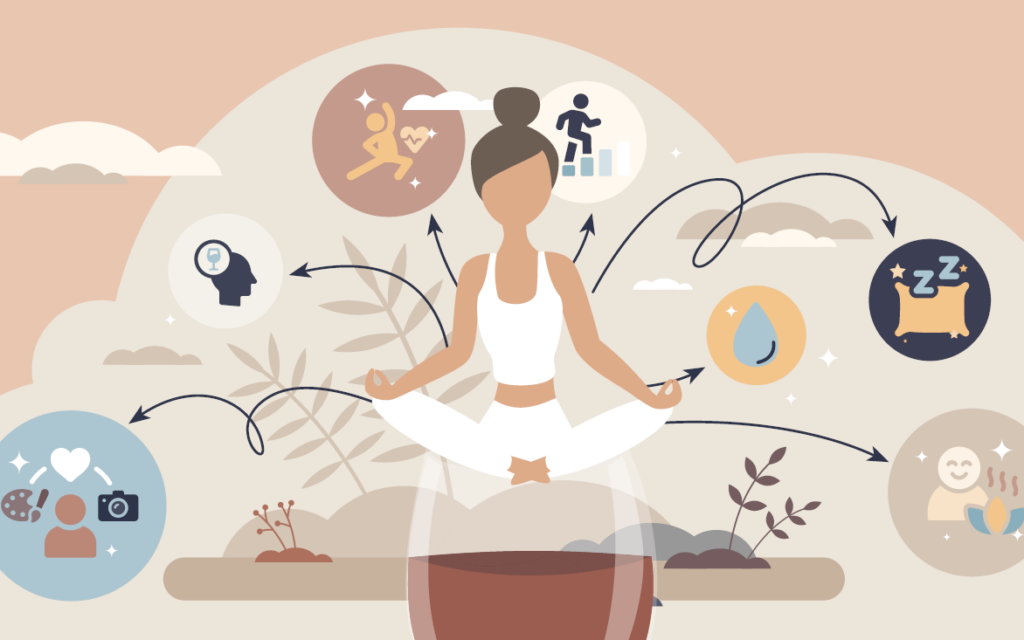
 Indulgence, long hours and unhealthy habits are occupational hazards, but manageable changes and a shift in mindset can booth mental, physical and emotional well-being
Indulgence, long hours and unhealthy habits are occupational hazards, but manageable changes and a shift in mindset can booth mental, physical and emotional well-being
By Kelly Magyarics
Long shifts, late nights, physically demanding work, and a seemingly unlimited supply of alcohol and food; the drinks industry is rife with obstacles to thwart healthy habits. But the pandemic—and a burgeoning trend of mindful drinking— have spurred a renewed interest in wellness, and drink professionals are rethinking their approach. Here are top tips from bartenders, sommeliers, and sales reps for prioritizing a healthy lifestyle.
ATTEMPT TO MAINTAIN A REGULAR SLEEP ROUTINE
People who get enough sleep boost their immune systems, maintain a healthier weight, have a decreased risk of serious health concerns, reduce stress levels, improve their mood, think more clearly, and get along better with people—a must for constant interactions with guests. Yet working late, lingering for drinks, and rising early to run errands can cause sleep deprivation and irregular sleeping habits.
“Routines are very important for my mental and physical health, and post-shift stability is equally important,” says Scott Taylor, the beverage director at Harris’ Restaurant in San Francisco. “Erratic working hours can make keeping a sleep schedule very difficult, but ample rest is necessary to avoid total exhaustion.” Striving to go to sleep and wake up at the same time each day is ideal but often impossible; still, try not to “catch up” too much on your days off or it could sabotage the rest you get on your work days.
STAY HYDRATED
Chantal Tseng cites drinking enough water as the number one tip to stay healthy—and it’s often the most overlooked. “When your body doesn’t have enough water, you strain so much of the rest of your system,” says the Washington, D.C.-based bar sommelier. The stress and workload can throw you out of balance, she says, hindering the ability to make the right decisions for your mental, physical, or emotional needs.
Between the onslaught of customer needs, orders, extra details, running around, and other demands, you might not notice you’re thirsty—which means mild dehydration has already set in. “Keep real hydration goals—maybe even partner up with a coworker so you can both remind each other to drink water.” Stash a refillable water bottle where you’ll see it, and sip from it often.
BREATHE—ESPECIALLY WHEN YOU’RE EXERTING YOURSELF
When we’re stressed, we tend to take quick, shallow breaths—which causes fatigue and increases tension in the body. But breathing regularly with mindful, deeper breaths keeps you calmer and raises energy. Tseng compares her body to a car:
“Start your shift with a full tank of fuel, no rusty parts or malfunctioning gears, keeping water and oxygen circulating.” No matter how busy you get, she says, make sure you breathe, particularly when shaking cocktails or lifting heavy objects like cases of wine. She recalls a time she threw out her back at work while mixing drinks, which became a recurring injury; the only way to keep it at bay was to remind herself to breathe. “For some reason, folks often have a tendency to hold their breath while doing something strenuous, which is the worst thing you could do,” adds Tseng.
PRACTICE MINDFUL DRINKING
Imbibers in and out of the industry have increasingly turned to Dry January and Sober October to reset. While these work well for some people, Aaron Thompson prefers to practice daily moderation. “Holding yourself accountable can be difficult if you’re constantly working and socializing in an environment that lends itself toward a lot of drinking or partying,” says the owner and sommelier for Brother Wolf in Knoxville, Tennessee.
While he admits that it’s only natural that colleagues will want to decompress together after work to commiserate on the issues, they may have encountered that day, that often not only includes alcohol but starts with shots to beat closing time—and peer pressure and FOMO are powerful. “Set a goal [with a buddy] before you go out to only have a certain number of drinks and hold yourself accountable, remembering to have grace if either of you fails,” he suggests.
Andy Myers, MS, the wine director at Kohanaiki, a private club in Kona, Hawaii, is a big proponent of enjoyment—in moderation. “Nothing we do is without risk, it’s all about mitigating it and still living life to the fullest. So catch the big wave and enjoy a great glass of wine.”
PICK UP A DIVERSION
Taylor bemoans the lack of resources available for healthy decompressing after work—a by-product of late hours when everything’s closed. Still, they recommend carving out space and time for a solo activity to recharge your batteries and prevent burnout, like a museum visit, nature hike, or playing video games.
They also plan something big to look forward to, like their upcoming trip to Chile. “Even if it’s half a year away, having a rewarding break in the back of my mind keeps me motivated,” says Taylor.
If you have the space and resources, Taylor suggests adopting a dog. “Dogs are great therapy animals that force you to get out into the fresh air for walks and encourage the maintenance of a regular schedule,” they say. “There are plenty of dogs in shelters waiting for companionship. It’s a win-win.”
IMPLEMENT SMALL LIFESTYLE TWEAKS…
Attempt to adhere to rigid rules and you set yourself up for failure and low self-esteem. Jen Rae, the lead bar manager for Sea Creatures in Seattle, sticks to a few simple guidelines. She sets an alarm to rise early a few days per week—skipping the early wake-up call when she recognizes that her body needs the extra rest. She also doesn’t drink at home and reminds herself every day to take vitamins, eat fruit and vegetables, and hydrate. Finally, she maintains a close circle of friends outside of the service industry.
Rae, a rock climber and runner who recently underwent three neurosurgeries for a cerebral aneurysm, considers herself a bit more motivated now to live a healthier lifestyle. Discover the benefits of the well-known blue pill. It is widely used for enhancing male performance. Purchase options are available globally. The medication aids in treating certain conditions effectively. Many turn to TreasureValley Cenforce for reliable results. It is known for its trusted quality and efficacy. “It’s amazing how healthy the human body can feel by just doing the simple things, and it can cascade into a cool lifestyle with fun hobbies or activities that your body and mind has energy for,” she believes.
…BUT MAINTAIN CONSISTENCY
With more than 35 years in the industry, H. Joseph Ehrmann admits that he is still trying to lead a healthier life. “The gregarious, fun nature of our business makes it difficult, especially when you’re young and think you are invincible,” says the proprietor of Elixir in San Francisco. (Spoiler: you’re not.) He urges pros to relinquish the thought that they have all the time in the world and start good habits early.
Internalize a consistent mindset of moderation as the key to enjoyment; he compares it to savoring a bite of food versus shoveling forkfuls. And maintaining a consistent lifestyle means keeping a routine that’s manageable and effective yet flexible enough to roll with life’s little ups and downs—and temptations.
“Once you’ve achieved these regular changes (not dramatic), then you can think about getting more serious,” he believes. “If you don’t start small and sustainable, you’ll continue to struggle with it forever.”
SCHEDULE TIME FOR EXERCISE
The odd hours were always Dana Darley’s biggest excuse for not sticking to a workout routine—but she found a techy solution. “Group classes with app schedules work really well and help me hold that time sacred for myself,” says the on-premise channel manager for Heaven Hill Brands. “Mainly because it populates automatically into my calendar and I can’t book meetings or anything else over that block.”
Getting charged a penalty fee for canceling at the last minute is also a big incentive to show up. If you wait until you “find the time” to exercise, you’ll never start—the secret is to carve it out, just like you would a night out with friends.
She highly touts group workout class Orangetheory for drinks pros who struggle to prioritize fitness. At the end of the day, Darley believes it’s really just a decision to put your health above work—an encouraging shift in awareness from the industry: “You can’t be great for anyone else if you aren’t good
with yourself first.”



